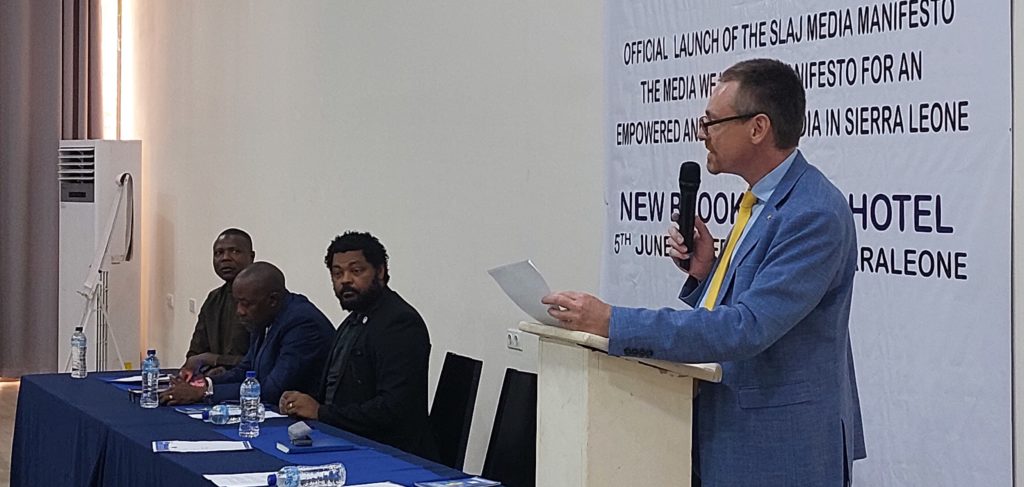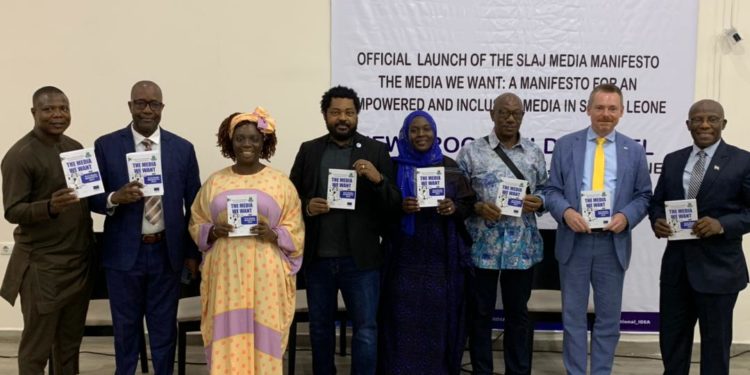For the first time in its history, the Sierra Leonean media has presented a blueprint of its vision to contesting parties in an election.
The Sierra Leone Association of Journalists (SLAJ) Media Manifesto 2023 was unveiled on June 5, about two weeks before the June 24th general elections.
Incumbent President Julius Maada Bio is seeking re-election for his second and final five-year term.
The Bio administration has been credited for major reforms towards a free media in the last five years, notably the decriminalization of libel and sedition.
According to SLAJ, “The Media We Want”, as the media manifesto is called, outlines a vision for the media that goes beyond just guaranteeing journalists to operate free but also provides them the opportunity to thrive.
“The manifesto is a catalogue of realistic, achievable and time-bound actions and strategies to advance media freedom, media professionalism, viability, gender equality and inclusivity, safety and security of journalists and media literacy in Sierra Leone,” SLAJ said in a statement issued following the launch of the document.
It notes that the manifesto built on the collective progress Sierra Leone had made in terms of freedom of speech and efforts towards its independence with the historic media viability and investment conference convened in 2021.
The idea, it adds, is to seek commitment for concrete action from political leaders and other stakeholders to prioritise media freedom, media development and media viability in the coming years.
“This manifesto is to consolidate the significant gains we have made in the last five years, and respresents our collective vision and aspiration as journalists for the media we want in the next years. We want the buy-in of politicians and hope that this document will serve as the framework for all future interventions in the media sector in Sierra Leone,” SLAJ President Ahmed Sahid Nasralla was quoted in a statement.

The document was developed with support from the European Union through the International Institute for Democracy and Electoral Assistance (International IDEA). It was all done under its Sierra Leone Democracy Strengthening Programme.
Dr. Idrissa Mamoud Tarawallie, International IDEA’s Head of the Sierra Leone Country Programme, said their goal is to promote democratic governance.
“The mission of International IDEA is to promote and strengthen the values and ethos of democracy and democratic governance globally. The media is a partner in achieving this mission, because public interest media is critical for democratic strengthening as it provides platform for dialogue, debate and holding elected leaders to account”.
“The European Union will continue to stand with the media, to offer opportunities that can further strengthen its capacity, and to support media initiatives to protect media freedom and pluralism,” added Manuel Muller, EU’s representative in Sierra Leone.
The EU has been providing support for the media, particularly through SLAJ and the regulatory authority, the Independent Media Commission.
One area of interest for the EU is to promote professionalism in the media.
Ambassador Muller therefore announced a plan to the provide the IMC with equipment and institutional capacity support to enable it implement its “renewed and strengthened mandate.”
Dr Victor Massaquoi, Chairperson of IMC, said the media manifesto was part of the “new political logic” and that it reflected media development, media freedom and media regulation that is not restrictive.






















